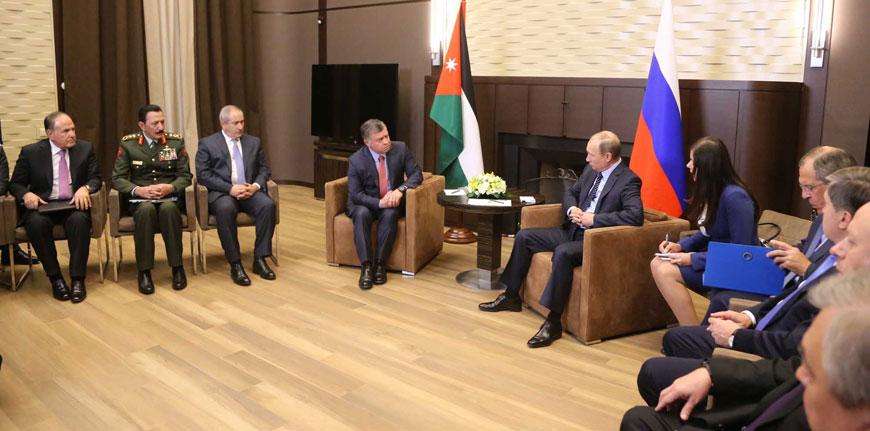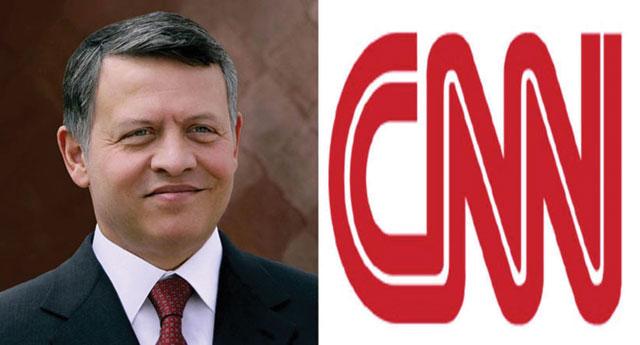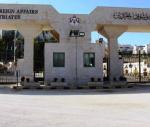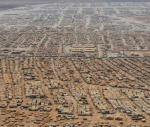You are here
Economy ‘keeps us up at night’ — King
By JT - Apr 14,2015 - Last updated at Apr 14,2015
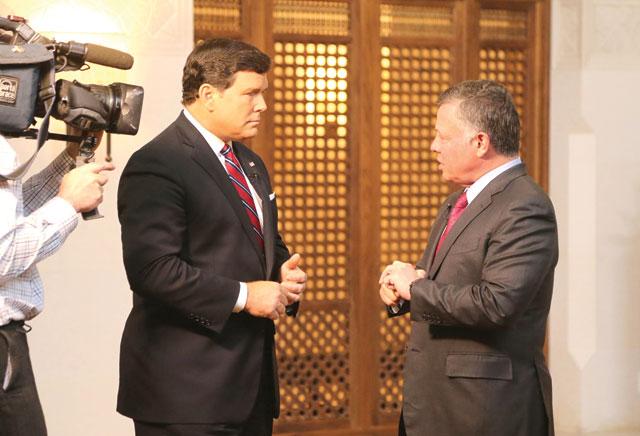
AMMAN — Jordan's biggest challenge is the economy, His Majesty King Abdullah said, noting that this is "what keeps us up at night".
In an interview with Fox News Channel's chief political anchor and executive editor and anchor of Special Report, Bret Baier, excerpts of which were broadcast Tuesday, the King said Jordan hosts 1.5 million Syrian refugees.
"That is almost 20-21 per cent of our population. And when this year only 28-29 per cent of the refugee budget is being covered by the whole international community, and the rest we have to cover, it is pretty depressing, quite honestly," His Majesty said in the interview.
He stressed that economy, rather than border security is the main challenge.
"From a military and a strategic point of view, if you look at the map, ISIS [Daesh] is actually not near us. And that is not by accident. They are in the eastern part of Syria, up north. They are in, you know, 100 to 120 kilometres away from the Iraqi border," the King noted.
His Majesty also highlighted challenges in the Middle East and Jordan's position towards them, noting that Islam's war against terrorists is not a new development.
"We’ve been at war against what we call these outlaws of Islam, in Arabic we call them 'Khawarij', for many, many years, and I don’t think a lot of Muslims understood that," he said, noting that this realisation dawned on them after major incidents such as the Paris shooting for French Muslims and the murder of pilot Muath Kasasbeh for Jordanians.
"I think our society needs to be shocked to the extent of what these Khawarij, these outlaws, are actually all about," the King added.
"I hate to use the word extremist because they take that as a badge of honour. I don’t know what these people are. These are outlaws, these are renegades. They have nothing to do with understanding of what our religion is about," he said, noting that they target Muslims before followers of other faiths.
Holistic anti-terror approach
King Abdullah likened terror groups such as Daesh, Boko Haram and Al Qaeda to a franchise, with all pledging allegiance to the "the next worst element that comes up".
"The problem is that they are international and I don’t think that the international community realises that they have to be dealt with internationally. So, today we are focusing on what you call ISIS, we call Daesh, in Syria and Iraq, but at the same time in 2015 we have to have a holistic approach," he said.
Jordan, His Majesty said, plays a major part in the anti-Daesh fight.
"We are at the moment the only Arab country operating in Syria, alongside the United States ... We are the only Arab country operating alongside the Iraqis in Iraq, alongside the coalition forces, and as the Iraqis and the coalition increase their tempo for the next phase of operations inside of Iraq, so will Jordan increase its tempo in support of Iraq."
Iran
In response to a question on Iran and its nuclear negotiations with the US, the King said Tehran has "a lot of different cards" that should all be addressed when dealing with it.
In addition to its nuclear programme, Iran has a role in Iraq, Syria, Lebanon, Yemen, the Horn of Africa and Afghanistan, as well as its tensions with Pakistan, on its borders, according to King Abdullah.
"If they can be a building block of stability, as these discussions move forward, then all great and fine, but it can’t be taken — I think — piece by piece. I hope that the next phase of discussions with the Iranians is how can we move ahead on all these issues."
Responding to a question on the situation in Yemen, the King said “the quicker we find a political solution to that issue, the better”.
Relations with US
Turning to the US role in the Middle East, His Majesty said Washington’s relationship with its allies in the region has changed.
“I think the Arab Spring was a lesson for all of us in the region in how we deal with our friends. We express our views to our Western allies, but I think the difference is now, we express them quite strongly,” he said.
“For me definitely, it has been a wake-up call that we need to stand more on our two feet and take our own decisions and be more bullish and straight-forward about it. At the end of the day, I think I know what’s best for my country and for the region. And I think a blunt and honest discussion with friends is always much better than being wishy-washy,” the King added, noting that Jordan’s relations with the US have gotten stronger over the years “because we’ve worked so closely together on so many issues”.
Washington’s relations with two of Jordan’s “strong allies” — Egypt and Morocco — have also grown stronger, His Majesty said, and this is an asset for the fight against terrorism, including the Boko Haram and Al Shabab threat, and the challenges in Sinai and Libya.
Syria
The King warned that Syria will fall apart if no political solution is reached between the regime and the opposition, but stressed that the situation is chaotic and a moderate opposition must be involved in negotiations.
“We have to redefine the moderate opposition. You know, you have got to find people from the inside. So, if you can do that, you have to find a political solution, because the more this goes on, the more the country falls apart,” he said.
“We technically have two wars going on [in Syria] at the moment, one against the regime and one against Daesh. So, which one is the priority? In my view, today it is Daesh; they are the main problem.
Iranians have also been active on the ground in Syria, the King noted.
Despite all the regional and internal challenges, His Majesty said he makes it a point to spend time with the family.
“I have dinner with my kids every night. I try and have at least a day with them on the weekends. You know, I Skype with my kids in the States all the time,” he said.
Related Articles
Following is the full text of His Majesty King Abdullah’s interview with Mikhail Gusman for TASS News Agency/Russia-24 Television released o
AMMAN — His Majesty King Abdullah on Tuesday said the current regional developments will compel the international community to work together
CNN network is expected to air on Sunday a full interview with His Majesty King Abdullah, excerpts of which were published on Friday and Saturday.


